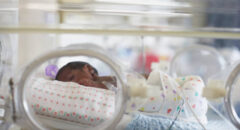 Expectant mothers worried about their chances of having a premature baby may want to be more mindful of the weather.
Expectant mothers worried about their chances of having a premature baby may want to be more mindful of the weather.
RELATED: 5 Things Black Women Should Know About Preterm Birth
According to research, exposure to extreme hot or cold conditions during pregnancy can put the unborn child at an increased risk for preterm birth.
“Our findings indicate that it may well be prudent to minimize the exposure of pregnant women to extremes in temperature,” said Pauline Mendola, researcher at the National Institutes of Health (NIH).
The first seven weeks of pregnancy are crucial, according to the study. It’s at this time that heatwaves or cold spells can lead to early delivery.
But for a woman exposed to extreme heat for most of her pregnancy, there were risks of preterm birth as well.
“[Researchers] theorized that, during cold spells, people are more likely to seek shelter and so could more easily escape the cold’s effects,” according to NIH. “But during extreme heatwaves, people are more likely to endure the temperature, particularly when the cost of or access to air conditioning is an impediment."
More than 223,000 births at 12 clinical centers across the U.S. were reviewed for this study, which was published in Environmental Health Perspectives, a medical journal. Researchers compared the birth times to hourly temperature records in the region of each clinic.
RELATED: Mothers With Asthma Potentially At Higher Risk of Preterm Birth
For women who experienced cold spells for the first seven weeks of pregnancy, there was a 20 percent increased risk of delivering their child before 34 weeks. If the first seven weeks occurred on hot days, there was an 11 percent increase in birth before 34 weeks.
Preterm birth, which is the birth of a child before 37 weeks, puts infants at risk for death or long-term disability.
“The researchers theorize that the stress of temperature extremes could hinder the development of the placenta or alter blood flow to the uterus, both of which could potentially lead to early labor,” NIH wrote.
How to protect yourself in extreme temperatures
If you are pregnant, you need to take special care when dealing with extreme temperatures, whether it's extreme heat or cold. Here are some tips to help you stay safe and comfortable in extreme temperatures:
In Extreme Heat
- Stay Hydrated: Drink plenty of water throughout the day to prevent dehydration. Dehydration can lead to overheating and other complications.
- Wear Appropriate Clothing: Choose loose-fitting, lightweight, and breathable clothing in light colors. A wide-brimmed hat and sunglasses can also provide sun protection.
- Seek Shade: When outdoors, stay in shaded areas as much as possible to avoid direct sun exposure.
- Cool Down: Use fans, air conditioning, or cool showers to lower your body temperature.
- Limit Outdoor Activities: Avoid strenuous activities during the hottest parts of the day. If you need to be outside, do so during cooler hours, like early morning or evening.
- Elevate Feet: If you experience swelling, elevate your feet when resting to improve circulation.
- Use Sunscreen: Use pregnancy-safe sunscreen to protect your skin from the sun's harmful rays.
- Monitor Your Body: Pay attention to signs of heat exhaustion or heatstroke, such as dizziness, nausea, rapid heartbeat, or confusion. Seek shade and hydrate immediately if you experience these symptoms.
In Extreme Cold
- Dress in Layers: Wear several layers of clothing to trap heat and insulate your body. Make sure to cover extremities like hands and feet.
- Wear Warm Accessories: Invest in warm gloves, scarves, and hats to keep your body heat from escaping.
- Stay Dry: Wet clothing can make you feel much colder. Ensure that you stay dry, especially in cold and damp conditions.
- Use Proper Footwear: Wear insulated and waterproof boots to protect your feet from cold and wet conditions.
- Limit Exposure: Minimize the time spent outdoors in extremely cold weather. If you need to be outside, take frequent breaks indoors to warm up.
- Stay Active: Light physical activity can help improve circulation and keep you warm. Just make sure not to overexert yourself.
- Hydrate: Even in cold weather, staying hydrated is important. Drink water regularly to keep your body functioning properly.
- Monitor for Hypothermia: Watch for signs of hypothermia, such as shivering, confusion, drowsiness, and slurred speech. Seek warmth and medical attention if you experience these symptoms.
Remember that extreme temperatures can put additional stress on your body during pregnancy. It is important to listen to your body, take breaks as needed, and consult your healthcare provider if you have any concerns about how the extreme temperatures might be affecting you and your baby. It's important to prioritize your comfort and well-being during pregnancy.








